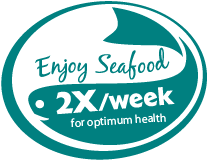
Seafood and Your Health Links:
Seafood and Your Health
There are many benefits to eating seafood. In fact, the newest public health research suggests convincingly that the benefits of seafood in your diet far outweigh the risks. In a landmark study published in the Journal of the American Medical Association (October 18, 2006-Vol. 296, No. 15), Dr. Dariush Mozaffarian and colleagues found that eating at least one serving of fish—particularly fatty fish such as salmon or sea bass—per week not only promotes heart health, it cuts the risk of dying from heart disease by 36 percent. "Seafood is likely the single most important food one can consume for good health," the study claims, and with good reason.
All seafood contains long-chain polyunsaturated fatty acids, referred to as n-3s or Omega-3s. And two specific components of Omega-3s known as eicosapentanoic acid, or EPA; and docosahexaenoic acid, or DHA are responsible for most of the health benefits. Found almost exclusively in fish, these nutrients have, since the 1970s, been linked to a low incidence of cardiovascular disease in populations that consume a significant amount of fish.
Since those early findings in the 1970s, scientific research conducted all over the world has validated the earliest population studies, and new research into the benefits of a diet high in seafood (particularly fatty fish such as salmon) suggests that a linkage between eating seafood and preventing many chronic health conditions such as diabetes and obesity.
The newly published 2010 Dietary Guidelines for Americans now includes a recommendation to eat seafood twice a week, with at least one of those servings from the so-called "fatty fishes." Issued by the U.S. Department of Agriculture (USDA) and the Department of Health and Human Services (HHS), these guidelines are intended for Americans age two and older, and serve to help people make informed food choices that lead to better health. To learn more about the new guidelines, visit Dietary Guidelines.
Fish Oil Capsules or Fish?
Food manufacturers today offer a vast array of products that are fortified with Omega-3s. And fish oil capsules are advertised widely as a "magic bullet," but new scientific research makes it clear: You need to eat fish.
"Seafood is rich in antioxidants, fat-soluble and water-soluble vitamins, easily digestible proteins with special amino acid composition, minerals, trace elements, and fat of the healthy, polyunsaturated type," writes Dr. Edel Elvevoll of the University of Tromsø in Norway. This respected researcher carried out a clinical study showing that "the uptake of omega-3 is three to four times greater from salmon fillets than from fish oil." One of the important vitamins is the so-called "sunshine vitamin," Vitamin D. Vitamin D is now associated with bone health, brain function, and the prevention of certain immune diseases. In addition to Vitamin D, seafood contains taurine, which is cited by researchers as one of the elements that contributes to the cardiovascular benefit of eating seafood.



